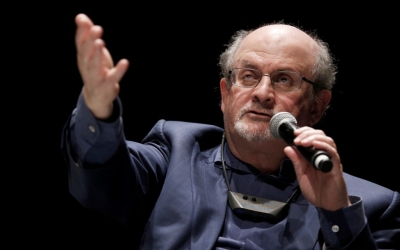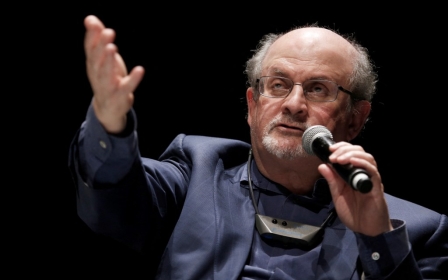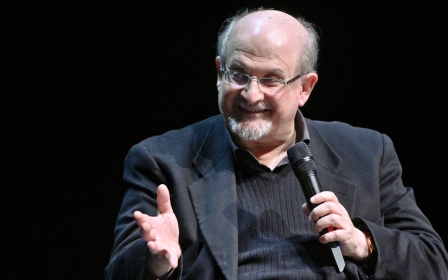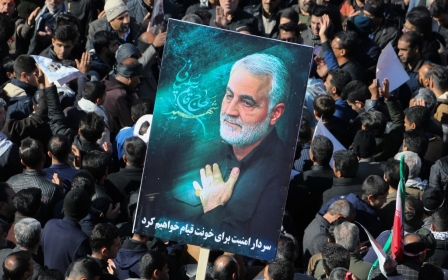'Recovery has begun': Salman Rushdie off ventilator, says agent
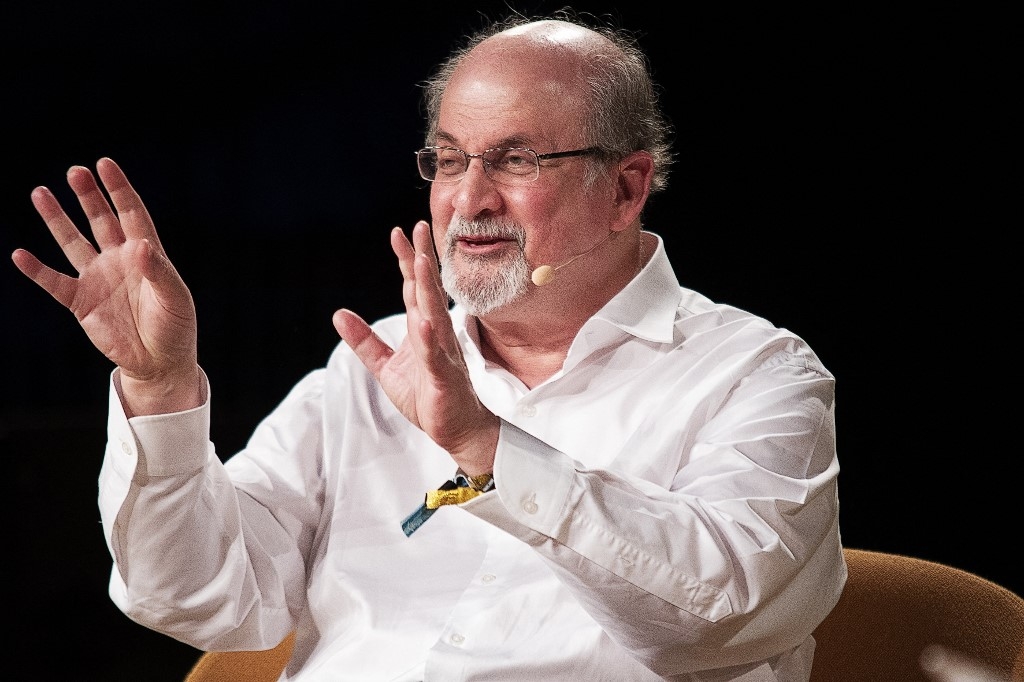
Salman Rushdie, the acclaimed author who was hospitalised on Friday with serious injuries after being repeatedly stabbed at a public appearance in New York state, is off a ventilator and his condition is improving, his agent and a son said on Sunday.
"He's off the ventilator, so the road to recovery has begun," his agent, Andrew Wylie, wrote in an email to Reuters. "It will be long; the injuries are severe, but his condition is headed in the right direction."
New MEE newsletter: Jerusalem Dispatch
Sign up to get the latest insights and analysis on Israel-Palestine, alongside Turkey Unpacked and other MEE newsletters
Rushdie, 75, was set to deliver a lecture on artistic freedom at Chautauqua Institution in western New York state when police say a 24-year-old man rushed the stage and stabbed the Indian-born writer, who has lived with a bounty on his head since his 1988 novel The Satanic Verses prompted Iran to urge Muslims to kill him.
The suspect, Hadi Matar of Fairview, New Jersey, pleaded not guilty to charges of attempted murder and assault at a court appearance on Saturday, according to his court-appointed lawyer, Nathaniel Barone.
Following hours of surgery, Rushdie had been put on a ventilator and was unable to speak as of Friday evening, Wylie said in a prior update on the novelist's condition, adding that he would likely lose an eye and had nerve damage in his arm and wounds to his liver.
One of Rushdie's sons said his father was able to say a few words after getting off the ventilator.
"Though his life changing injuries are severe, his usual feisty & defiant sense of humor remains intact," Zafar Rushdie wrote on Twitter.
The stabbing has been condemned by writers and politicians around the world as an assault on freedom of expression. In a statement on Saturday, US President Joe Biden commended the "universal ideals" of truth, courage and resilience embodied by Rushdie and his work.
"These are the building blocks of any free and open society," Biden said.
Neither local nor federal authorities have offered any additional details on the investigation, including a possible motive.
An initial law enforcement review of Matar's social media accounts showed he was sympathetic to Iran's Islamic Revolutionary Guard Corps (IRGC), although no definitive links to Iran had been found, according to NBC New York.
The IRGC is an elite branch of the Iranian military that controls a business empire as well as armed and intelligence forces. Washington accuses the group of carrying out a global extremist campaign.
Authorities in Iran have made no public comment about the attack, although hardline state media outlets have celebrated it with headlines including "Satan has been blinded," and some Iranians voiced support online for the stabbing.
Many other Iranians expressed their sympathies for Rushdie, however, posting on social media about their anger at the Islamic Republic's clerical rulers for issuing the 1989 fatwa, or religious edict, that told Muslims to kill the author.
Bounty Worth Millions
Rushdie, who was born into a Muslim Kashmiri family in Bombay, now Mumbai, before moving to Britain, has long faced death threats for The Satanic Verses, viewed by some Muslims as containing blasphemous passages. The book was banned in many countries with large Muslim populations.
Iranian organisations, some linked to the government, have raised a bounty worth millions of dollars for Rushdie's murder. The fatwa was issued 33 years ago by Ayatollah Ruhollah Khomeini, then Iran's supreme leader. His successor, Ayatollah Ali Khamenei, said as recently as 2019 that the decree remained "irrevocable".
Matar was born in California and recently moved to New Jersey, the NBC New York report said, adding that he had a fake driver's license on him. He was arrested at the scene by a state trooper after being wrestled to the ground by audience members.
Witnesses said he did not speak as he attacked the author. Rushdie was stabbed 10 times, prosecutors said during Matar's arraignment, according to the New York Times.
Prosecutors said in court that Matar traveled by bus to the Chautauqua Institution, an educational retreat about 19km from the shores of Lake Erie, and bought a pass that admitted him to Rushdie's talk, the Times reported. Attendees said there were no obvious security checks.
Asked to comment on the case, Matar's lawyer Barone said, "We're kind of in the early stages and, quite frankly, in cases like this, I think the important thing to remember is people need to keep an open mind. They need to look at everything. They can't just assume something happened for why they think something happened."
Ali Tehfe, mayor of Yaroun in southern Lebanon, said Matar was the son of a man from the town. The suspect's parents emigrated to the United States and he was born and raised there, the mayor said.
Asked whether Matar or his parents were affiliated with or supported the Iran-backed Hezbollah armed group in Lebanon, Tehfe said he had "no information at all" on their political views.
A Hezbollah official told Reuters on Saturday that the group had no additional information on the attack on Rushdie.
Middle East Eye delivers independent and unrivalled coverage and analysis of the Middle East, North Africa and beyond. To learn more about republishing this content and the associated fees, please fill out this form. More about MEE can be found here.


